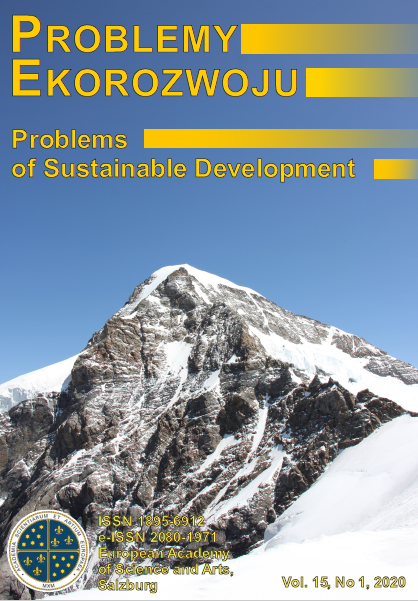Ethics of Sustainable Development from the View of A. Badiou’s Critique of Contemporary Ethics
Article Sidebar
Issue Vol. 15 No. 1 (2020)
-
China’s Environmental Protection in the New Era from the Perspective of Eco-civilization Construction
Qingzhi Huan7-14
-
The Function and Perception of Urban Ecosystem Services in the Society
Fredrik Edlund15-23
-
Immigration and Social Aspects of Sustainable Development. The Case of Germany
Paweł Rydzewski25-31
-
Achieving Sustainable Competitive Advantage Through Intellectual Capital and Corporate Character: The Mediating Role of Innovation
Huan Xiao, Dengke Yu33-45
-
Ethics of Sustainable Development from the View of A. Badiou’s Critique of Contemporary Ethics
Andrzej Papuziński47-52
-
Ecological Performance: Ethnic Fragmentation versus Governance Quality and Sustainable Development
Viktor Koziuk, Yuryi Hayda, Oleksandr Dluhopolskyi, Serhii Kozlovskyi53-64
-
The Theoretical Foundations of Management in Terms of the Implementation of the Process of Globalization and Sustainable Development in the Real Sphere
Franciszek Piontek65-69
-
Does Appearance of the Migrants Change Citizens Perception of the Public Space? Case Study of Disturbed Sustainability, Belgrade, Serbia
Nataša Danilović Hristić, Nebojša Stefanović71-80
-
Consumption and Sustainable Development: Ethical Aspects
Maria Miczyńska-Kowalska81-88
-
The Role of Language in Sustainable Development: Multilingualism and Language Literacy in India
Neha Toppo, Mojibur Rahman89-93
-
Value Theory in the Economics of Sustainable Development
Małgorzata Pink95-102
-
Women’s Attitude Towards Environment Sustainability Through Natural Preservation
Jyoti Kumari, Ajit Kumar Behura, Sarita Kar103-107
-
The Impact of Selected Biotechnology Processes for Sustainable Development of the Environment and Human Life
Aleksandra Badora, Magdalena Celińska109-117
-
Surveys as Means of Understanding User-behaviour with Respect to Energy Usage in Households, Prior to Decision-making to Promote Sustainability
G Venkatesh, Are Kjeang119-134
-
Sustainable Habitat as the Main Factor of Urbanization Development: 19th-20th Centuries
Azizov Aghasalim135-148
-
A Comprehensive Approach: Inclusive, Smart and Green Urban Development
Justyna Przywojska, Aldona Podgórniak-Krzykacz149-160
-
Corporate Sustainability Practices in Polluting Industries: Evidence from India, China and USA
Prem Sagar Mishra, Ajay Kumar, Niladri Das161-168
-
The Possibility of Using Winter Oilseed Rape (Brassica napus L. var. Napus) for Energy Purposes
Jakub Siemek, Jan Macuda, Łukasz Łukańko, Jakub Nowak, Tadeusz Zając167-177
-
Reconsidering Land System Changes in Borderlands: Insights from the China-ASEAN Borderland
Xiaobo Hua, Yasuyuki Kono179-187
-
NER300: Success or Failure of Public Support for Low-emission Technologies?
Grażyna Borys189-196
-
The Identification of the Luhansk Region and the Region Act’s According to the Qualification of Their Sustainable Development in the Conditions of the Joint Forces Operation
Inna Zablodska, Svitlana Hrechana, Daria Zablodska197-210
-
Sustainable Development Goals in Arab Region – United Arab Emirates’ Case Study
Adam Krzymowski211-220
-
Theatre for Sustainable Development: Jana Sanskriti’s Participatory Ideologue and Practice
Shubhra Ghoshal, Nirban Manna221-227
-
Risk and Uncertainty in Sustainable Development: Undertaking Politics of the Climate Change in the United States
Olena Ovchynnikova229-235
Archives
-
Vol. 17 No. 2
2022-07-04 26
-
Vol. 17 No. 1
2022-01-03 28
-
Vol. 16 No. 2
2021-07-01 26
-
Vol. 16 No. 1
2021-01-04 24
-
Vol. 15 No. 2
2020-07-01 24
-
Vol. 15 No. 1
2020-01-02 24
-
Vol. 14 No. 2
2019-07-01 20
-
Vol. 14 No. 1
2019-01-02 20
-
Vol. 13 No. 2
2023-10-15 22
-
Vol. 13 No. 1
2018-01-02 23
Main Article Content
DOI
Authors
Abstract
The main problem of that article is effectiveness / ineffectiveness of an axiological system of the sustainable development as the base of a program of activities taken in individual and social-political scale. The problem was presented from the view of Alain Badiou’s ethics, which is a trial of overcoming weaknesses of the contemporary ethics of the mainstream, especially very low effectiveness of the ethics in the sphere of social practice. For developing the title problem there was applied the critique of contemporary ethics as the ethics of consensus, conducted by Badiou. Established research prospect has a limited application. It allows exclusively and only for drawing a conclusions in the matter of possible usability of the ethics of sustainable development in the activities leading to the change of dominant stereotypes of thinking and standards of conduct nowadays. From the point of view of Badiou’s ethics this is the first, but necessary step on the way to answer a following question – does the ethic of sustainable development have actual causative power and is it effective in initiating and performing social changes?
Keywords:
References
BADIOU A., 2001, Ethics. An Essay on the Understanding of Evil, Verso, London – New York.
BRAND K.-W., 1997, Probleme und Potentiale einer Neubestimmung des Projekts der Moderne unter dem Leitbild ‚nachhaltige Entwicklung‘. Zur Einführung, in: Nachhaltige Entwicklung. Eine Herausforderung an die Soziologie, ed. Brand K.-W., Leske + Budrich Verlag, Opladen, p. 9-32. DOI: https://doi.org/10.1007/978-3-322-93682-0_1
JONAS H., 1979, Das Prinzip Verantwortung: Versuch einer Ethik für die technologische Zivilisation, Insel-Verlag, Frankfurt am Main.
KOPFMŰLLER J. et al., 2001, Nachhaltige Entwicklung integrativ betrachtet. Konstitutive Elemente, Regeln, Indikatoren, Edition Sigma, Berlin.
PAPUZIŃSKI A., 2017, Filozofia Raportu Brundtland, in: Theoria i praxis zrównoważonego rozwoju. 30 lat od ogłoszenia Raportu Brundtland, eds. Sadowski R. F., Łepko Z., Towarzystwo Naukowe Franciszka Salezego, Warszawa, p. 127-130.
PAWŁOWSKI A., 2008, Rozwój zrównoważony – idea, filozofia, praktyka, Komitet Inżynierii Środowiska PAN, Lublin.
RAWLS J., 2001, A Theory of Justice. Revised Edition, The Belknap Press of Harvard University Press, Cambridge, Mass.
REDCLIFT, M. R., 2009, Sustainable Development (1987-2005) – an Oxymoron Comes of Age, in: Problemy Ekorozwoju / Problems of Sustainable Development, 4(1), p. 33-50. DOI: https://doi.org/10.1002/sd.281
SANDEL M., 2012, What Money Can't Buy: The Moral Limits of Markets. Farrar, Straus and Giroux, New York.
TIBALDEO R. F., 2015, The Heuristics of Fear: Can the Ambivalence of Fear Teach Us Anything?, in: Ethics in Progress, 6(1), p. 225-238. DOI: https://doi.org/10.14746/eip.2015.1.9
UN, 1945, United Nations Charter, Article 1, http://www.un-documents.net/charter.htm#chapter-1 (20.05.2018).
WCED (World Commission on Environment and Development), 1987, Our Common Future, http://www.un-documents.net/ocf-ov.htm (19.07.2018).
WALZER M., 1994, Thick and Thin: Moral Argument at Home and Abroad, Notre Dame Press, Notre Dame, Indiana. DOI: https://doi.org/10.2307/j.ctvpj75nh
Article Details
Abstract views: 153
License

This work is licensed under a Creative Commons Attribution-ShareAlike 4.0 International License.






